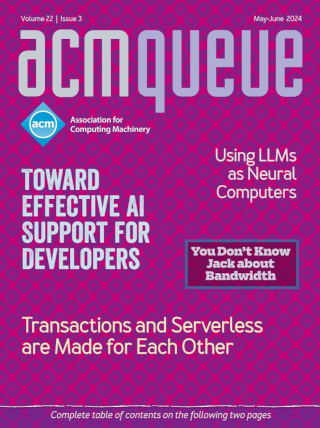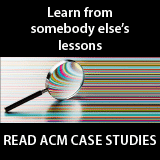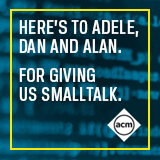When Curation Becomes Creation:
Algorithms, microcontent, and the vanishing distinction between platforms and creators
Media platforms today benefit from: (1) discretion to organize content, (2) algorithms for curating user-posted content, and (3) absolution from liability. This favorable regulatory environment results from the current legal framework, which distinguishes between intermediaries and content providers. This distinction is ill-adapted to the modern social media landscape, where platforms deploy powerful data-driven algorithms to play an increasingly active role in shaping what people see, and where users supply disconnected bits of raw content as fodder.
Resolved: the Internet Is No Place for Critical Infrastructure:
Risk is a necessary consequence of dependence
What is critical? To what degree is critical defined as a matter of principle, and to what degree is it defined operationally? I am distinguishing what we say from what we do.
Deduplicating Devices Considered Harmful:
A good idea, but it can be taken too far
During the research for their interesting paper, "Reliably Erasing Data From Flash-based Solid State Drives," delivered at the FAST (File and Storage Technology) workshop at San Jose in February, Michael Wei and his co-authors from the University of California, San Diego discovered that at least one flash controller, the SandForce SF-1200, was by default doing block-level deduplication of data written to it. The SF-1200 is used in SSDs (solid-state disks) from, among others, Corsair, ADATA, and Mushkin.
All-Optical Computing and All-Optical Networks are Dead:
Anxiously awaiting the arrival of all-optical computing? Don’t hold your breath.
We’re a venture capitalist and a communications researcher, and we come bearing bad news: optical computers and all-optical networks aren’t going to happen anytime soon. All those well-intentioned stories about computers operating at the speed of light, computers that would free us from Internet delays and relieve us from the tyranny of slow and hot electronic devices were, alas, overoptimistic. We won’t be computing or routing at the speed of light anytime soon. (In truth, we probably should have told you this about two years ago, but we only recently met, compared notes, and realized our experiences were consistent.)
Things I Learned in School:
As we continue to develop the new UI for our product, we’ll definitely be using FSMs wherever possible.
How many of us have not had the experience of sitting in a classroom wondering idly: "Is this really going to matter out in the real world?" It’s curious, and in no small amount humbling, to realize how many of those nuggets of knowledge really do matter. One cropped up recently for me: the Finite State Machine.
From Here to There, the SOA Way:
SOA is no more a silver bullet than the approaches that preceded it.
Back in ancient times, say, around the mid ’80s when I was a grad student, distributed systems research was in its heyday. Systems like Trellis/Owl and Eden/Emerald were exploring issues in object-oriented language design, persistence, and distributed computing. One of the big themes to come out of that time period was location transparency—the idea that the way that you access an object should be independent of where it is located. That is, it shouldn’t matter whether an object is in the same process, on the same machine in a different process, or on another machine altogether.
Only Code Has Value?:
Even the best-written code can’t reveal why it’s doing what it’s doing.
A recent conversation about development methodologies turned to the relative value of various artifacts produced during the development process, and the person I was talking with said: the code has "always been the only artifact that matters. It’s just that we’re only now coming to recognize that." My reaction to this, not expressed at that time, was twofold. First, I got quite a sense of déjà-vu since it hearkened back to my time as an undergraduate and memories of many heated discussions about whether code was self-documenting.
Corba: Gone but (Hopefully) Not Forgotten:
There is no magic and the lessons of the past apply just as well today.
Back in the June 2006 issue of Queue, Michi Henning wrote a very good condensed history of CORBA and discussed how some of its technical limitations contributed to its downfall. While those limitations certainly aided CORBA’s demise, there is a very widespread notion that the ultimate cause was the ascendance of Web Services, a notion that is compounded with the further belief that Web Services’ dominance of the distributed computing landscape is indicative of its technical superiority to the systems that preceded it, such as CORBA and DCOM.
Ground Control to Architect Tom...:
Can you hear me?
Project managers love him, recent software engineering graduates bow to him, and he inspires code warriors deep in the development trenches to wonder if a technology time warp may have passed them by. How can it be that no one else has ever proposed software development with the simplicity, innovation, and automation being trumpeted by Architect Tom? His ideas sound so space-age, so futuristic, but why should that be so surprising? After all, Tom is an architecture astronaut!
Embracing Wired Networks:
Even at home, hardwiring is the way to go.
Most people I know run wireless networks in their homes. Not me. I hardwired my home and leave the Wi-Fi turned off. My feeling is to do it once, do it right, and then forget about it. I want a low-cost network infrastructure with guaranteed availability, bandwidth, and security. If these attributes are important to you, Wi-Fi alone is probably not going to cut it. People see hardwiring as part of a home remodeling project and, consequently, a big headache. They want convenience. They purchase a wireless router, usually leave all the default settings in place, hook it up next to the DSL or cable modem, and off they go.
Repurposing Consumer Hardware:
New uses for small form-factor, low-power machines
These days you have to be more and more creative when tackling home technology projects because the inventory of raw material is changing so rapidly. Market and product cycles continue to shrink, standard form factors are being discarded to drive down costs, and pricing is becoming more dependent on market value and less on direct manufacturing cost. As a result, standard modular building blocks are disappearing. New alternative uses for obsolete or low-price products are emerging, however.
Better Health Care Through Technology:
What can you do for aging loved ones?
Leveraging technology to support aging relatives in their homes is a cost-efficient way to maintain health and happiness and extend life. As the technology expert for my extended family, it has fallen to me to architect the infrastructure that will support my family’s aging loved ones in their homes as long as possible. Over the years, I have assisted four different senior households in achieving this goal, and although things have been bumpy at times, I have refined technical solutions and methodologies that seem to work well.
Rationalizing a Home Terabyte Server:
Self-indulgent, or a view of the future?
With 1 TB of RAID 5 storage, most of my friends believe I have really gone off the deep end with my home server. They may be right, but as in most things in life, I have gotten to this point through a rational set of individual upgrades all perfectly reasonable at the time. Rather than being overly indulgent to my inner geek, am I an early adopter of what will be the inevitable standard for home IT infrastructure? Here is my story; you be the judge.
The Burning Bag of Dung and Other Environmental Antipatterns:
And you think you have problems?
In my youth a favorite prank of the local delinquents was to place a paper bag full of doggy doo on a neighbor’s porch, light it on fire, ring the doorbell, and then flee. The home-owner, upon answering the door, had no choice but to stomp out the incendiary feces, getting their shoes dirty in the process. Why this scatological anecdote? Because it is a metaphor for work situations in which things have gotten so bad that the only way to “put the fire out” is to step into it. I call this the “burning bag of dung” antipattern.
There’s Still Some Life Left in Ada:
When it comes to survival of the fittest, Ada ain’t no dinosaur.
Ada remains the Rodney Dangerfield of computer programming languages, getting little respect despite a solid technical rationale for its existence. Originally pressed into service by the U.S. Department of Defense in the late 1970s, these days Ada is just considered a remnant of bloated military engineering practices.
Electronic Voting Systems: the Good, the Bad, and the Stupid:
Is it true that politics and technology don’t mix?
As a result of the Florida 2000 election fiasco, some people concluded that paper ballots simply couldn’t be counted. Instead, paperless computerized voting systems were touted as the solution to “the Florida problem.” Replacing hanging chads with 21st century technology, proponents claimed, would result in accurate election counts and machines that were virtually impossible to rig. Furthermore, with nothing to hand-count and no drawn-out recounts to worry about, computerized voting systems were expected to enable the reporting of results shortly after the polls had closed.
On Helicopters and Submarines:
SIP does a great job as a helicopter, but when you try to make it function as an IM submarine as well, disaster may follow.
Bernoulli vs. Archimedes - Whenever you see a movie that’s got a vehicle that’s part helicopter and part submarine, you know you’re in for a real treat. What could be cooler? One second, the hero’s being pursued by some fighter jets piloted by some nasty dudes with bad haircuts, dodging air-to-air missiles and exchanging witty repartee over the radio with a megalomaniac bent on world domination; and then, just as the hero is unable to evade the very last missile, he pushes a button, the craft dives into the ocean, and is surrounded by an oasis of peaceful blue.
Stand and Deliver: Why I Hate Stand-Up Meetings:
Stand-up meetings are an important component of the ’whole team’, which is one of the fundamental practices of extreme programming (XP).
According to the Extreme Programming Web site, the stand-up meeting is one part of the rules and practices of extreme programming: “Communication among the entire team is the purpose of the stand-up meeting. They should take place every morning in order to communicate problems, solutions, and promote team focus. The idea is that everyone stands up in a circle in order to avoid long discussions. It is more efficient to have one short meeting that everyone is required to attend than many meetings with a few developers each.”
User Interface Designers, Slaves of Fashion:
The status quo prevails in interface design, and the flawed concept of cut-and-paste is a perfect example.
The discipline, science, and art of interface design has gone stagnant. The most widely read books on the subject are primarily compendia of how to make the best of received widgets. The status quo is mistaken for necessity. Constrained in this chamber pot, designers wander around giving the users of their products little comfort or fresh air.
Big Storage: Make or Buy?:
We hear it all the time. The cost of disk space is plummeting.
Your local CompUSA is happy to sell you a 200-gigabyte ATA drive for $300, which comes to about $1,500 per terabyte. Go online and save even more - $1,281 for 1 terabyte of drive space (using, say, 7X Maxtor EIDE 153-GB ATA/113 5400-RPM drives). So why would anyone pay $360,000 to XYZ Storage System Corp. for a 16-terabyte system? I mean, what’s so hard about storage? Good question.
The Woes of IDEs:
Programming speed and quality are hindered by poor integrated development environment interfaces.
Preaching emanating from the ranks and gurus of the human interface world is slowly convincing management, software designers--and even programmers--that better human-machine interfaces can increase productivity by speeding the work, decreasing learning time, lowering the burden on human memory, and easing users’ physical and mental stress.
Securing the Edge:
Common wisdom has it that enterprises need firewalls to secure their networks.
Common wisdom has it that enterprises need firewalls to secure their networks. In fact, as enterprise network practitioners can attest, the "must-buy-firewall" mentality has pervaded the field.






